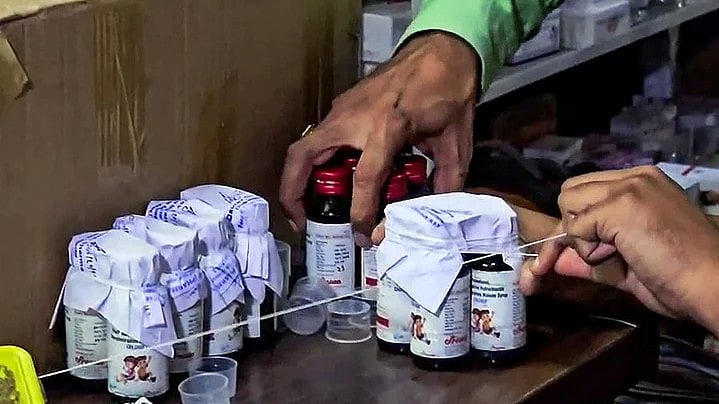Cough Syrups May Soon Require Prescription As DCC Seeks Stricter Controls
The DCC — the apex advisory body guiding uniform enforcement of drug laws across India — took this decision during its meeting held on November 17, 2025, chaired by Drugs Controller General (India) Dr Rajeev Singh Raghuvanshi.

Cough Syrups |
Mumbai: In a significant policy shift aimed at tightening the safety net around paediatric medicines, the Drugs Consultative Committee (DCC) has recommended removing all cough syrups from the Schedule K list, thereby making their sale permissible only under a doctor’s prescription. The move is expected to end the long-standing exemption that allowed unlicensed pharmacists in small villages to sell cough syrups as over-the-counter remedies.
The DCC — the apex advisory body guiding uniform enforcement of drug laws across India — took this decision during its meeting held on November 17, 2025, chaired by Drugs Controller General (India) Dr Rajeev Singh Raghuvanshi. The recommendation comes in the wake of the recent deaths of more than 20 children in Madhya Pradesh, attributed to contaminated cough syrup containing toxic levels of diethylene glycol (DEG). This follows past global incidents. In 2022, the World Health Organisation (WHO) linked DEG-contaminated cough syrups exported from India to child fatalities in Gambia.
During the meeting, the Committee examined a proposal to delete the exemption granted under Entry 13 of Schedule K of the Drugs Rules, 1945. This exemption currently permits the sale of household remedies — including aspirin, paracetamol tablets, balms, antacids, gripe water, and cough syrups — by unlicensed village pharmacists in areas with populations under 1,000. The minutes of the meeting clearly stated: “DCC deliberated the matter and approved the proposal.”
According to officials from DCC, the move will also prevent sale of cough syrups without prescription and check unlicensed shops to involve in illegal practice.
In addition, a key concern raised was the use of propylene glycol, a high-risk solvent commonly used in oral liquid formulations. The CDSCO informed the committee that several cases have emerged of syrups contaminated with DEG and ethylene glycol (EG), toxic impurities associated with poor-quality propylene glycol. Given that many paediatric formulations rely on such solvents, the risk of contamination remains substantial.
The DCC has directed the Central Drugs Standard Control Organisation (CDSCO) to hold consultations with relevant stakeholders to assess the prevalence of formulations using high-risk solvents and evaluate alternative excipients that can reduce toxicity risks. The Committee emphasised the urgent need for “taking stock of formulations manufactured using high-risk solvents.”
To get details on exclusive and budget-friendly property deals in Mumbai & surrounding regions, do visit: https://budgetproperties.in/
RECENT STORIES
-
-
-
-
-
